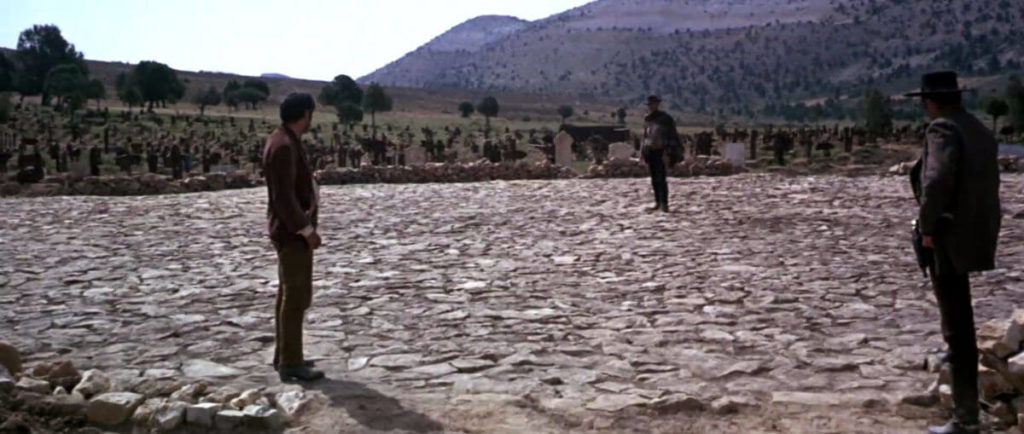
Roland, Harry, and Billy are three outlaws who recently arrived at the town of Deadwood. After realizing there’s not enough room for the three of them in this town, they decide to meet at the town center at noon, and duel to the death.
The rules of the duel are simple: each one, in his turn, gets to fire one shot at whomever he wants. This goes on until there’s only one man left standing.
Roland is an excellent shot, who never misses. Harry, on the other hand, is pretty good but not perfect, and hits the target 70% of the time. Billy is the worst shot of the three, and can only hit the target 30% of the time.
Since Billy is the youngest, and the worst shot by far, the other two outlaws let him go first. Roland, being the best shot of the three, agrees to let Harry go second, and therefore to go last himself.
Billy, now realizing he probably made a mistake entering this duel, is standing there and contemplating who to shoot, since leaving town is unfortunately no longer an option. What should he do if he wants to survive?
Game theory analysis
When it comes to choosing who to shoot, Billy has two options:
- Harry: If Billy shoots Harry and hits, Roland will kill him for certain on his turn, since Roland never misses.
- Roland: If Billy shoots Roland and hits, Harry will shoot him on his turn. While Harry only has a 70% chance of hitting Billy, that’s quite a bit better than Billy’s 30% chance of hitting Harry, and this is made worse by the fact that Harry gets to take the first shot at him.
As you can see, neither option looks too promising, though option B looks a bit better than option A. But what if there was a third, preferable option?
In fact, the best strategy for Billy is to fire his first bullet straight in the air. Then Harry, on his turn, will shoot at Roland, since he knows that if he doesn’t then Roland will kill him during the next turn (because Harry poses a bigger threat to Roland than Billy does).
If Harry kills Roland, then Billy gets to fire the first shot at Harry, which is better for Billy than having Harry take the first shot at him.
If Harry misses Roland, then Roland kills Harry on his turn. Then, Billy gets one shot at Roland, before Roland wipes him out.
Regardless of whether Harry misses or hits, Billy is better off missing his first shot intentionally, rather than trying to hit one of the other two outlaws.
The lesson
Sometimes, if you’re a little fish in a big pond, it’s better to stand back, and let the big fish take each other out before you step into the race. Often, the leader and the runner-ups can be so weakened by their attacks on each other, that those far behind them can take advantage of this and catch up. While doing this still didn’t guarantee that Billy will survive, his odds certainly improved in comparison to what would have happened if he had decided to step into the game from the start.
Other things we’ve learned
Being the big fish can actually be a disadvantage- in this scenario, Roland has the lowest odds of survival, despite being the best shot of the three. Being the big fish didn’t guarantee victory for him; instead, it just made him a bigger target.
Don’t give up a potential advantage- if Roland hadn’t let the other two guys go before him automatically, he would have had a much better chance of survival. Just because you’re the big fish, doesn’t mean you should give up any potential advantages.
Know how to pick your battles- though Billy was able to improve his odds by thinking strategically and waiting before entering the fight, he is still more likely to die than not. The truly smart move for him would have been to avoid this duel in the first place.
Summary and conclusions
- Often, being the big fish in a pond can be a disadvantage, because it makes you a bigger target.
- If you’re the big fish, don’t automatically give up all your potential advantages; just because you’re stronger doesn’t mean you’re guaranteed victory.
- If you’re the small fish, you can often benefit from hanging back before attacking, and letting the leader and the runner-ups weaken each other.
- The most important strategic consideration is knowing how to pick your battles. If you enter the wrong battle, even the best strategic thinking might not help much.
This strategy and example come from “The Art of Strategy: A Game Theorist’s Guide to Success in Business and Life”. It’s a good read for someone looking to understand basic game theory and how it applies to real-life situations.